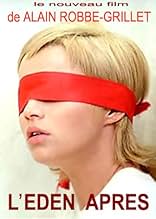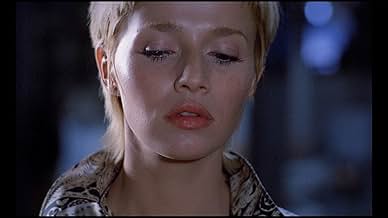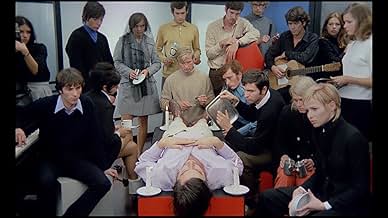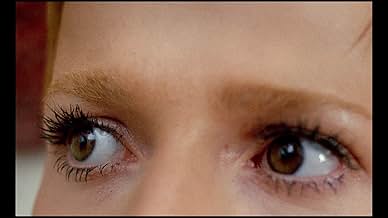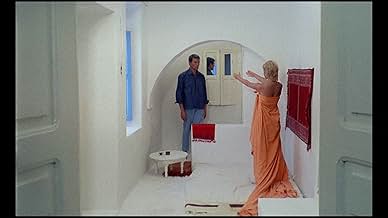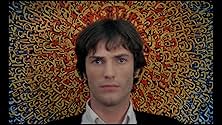IMDb रेटिंग
6.4/10
1.5 हज़ार
आपकी रेटिंग
अपनी भाषा में प्लॉट जोड़ेंA group of French students are drawn into the psychological and sexual games of a mysterious Dutchman. Once they sample his "fear powder" the students experience a series of hallucinations.A group of French students are drawn into the psychological and sexual games of a mysterious Dutchman. Once they sample his "fear powder" the students experience a series of hallucinations.A group of French students are drawn into the psychological and sexual games of a mysterious Dutchman. Once they sample his "fear powder" the students experience a series of hallucinations.
- पुरस्कार
- कुल 1 नामांकन
Jarmila Kolenicová
- Sonia
- (as Jarmila Kolenicova)
Ludovít Króner
- Franc
- (as Ludwik Kroner)
Eva Luther
- Violette's look-a-like
- (बिना क्रेडिट के)
फ़ीचर्ड समीक्षाएं
Director, Alain Robbe-Grillet clearly had a liking for young ladies in very short mini dresses and their being chased and sometimes caught and sometimes more. Well he films this so beautifully and has such a beautiful lead in Catherine Jourdan that it is hard to object too much. I understand this was inspired by composer Schoenberg's original twelve tone technique and so there are a number (twelve actually) elements of narrative with repetition but I'm not sure I'm too interested in all that. The film is wonderful to look at, at all times and has some sort of narrative flow but it can be an effort to stay with it because nothing ever seems to be resolved or made very clear. The director, of course wrote Last Year at Marienbad and the pretty young Jourdan appeared with Marianne Faithful in, Girl on a Motorcycle.
The four out of ten rating is because, despite the slick, pretty surfaces of attractive youth and whitewashed Tunisian buildings, the film is so pretentious that the viewer soon loses interest in what it might all mean.More seriously, though, we are now living in a more enlightened age when the casual dehumanization of women, whether in the work of the filmmakers or in their off screen lives, has become unacceptable.some of this has been overdone, as iñ the cancel culture of Woody Allen, Roman Polanski and Jim Toback leading to the suppression of seeing their latest movies. But people seem to have forgotten how an esteemed French man of letters was able to trade off of sadism toward women in his work, and get away with it.there was already a warning in Robbe Grillet 's "Marenbad" script when the woman kept telling the man to leave her alone and he kept harassing her.Now in the 1970 film we get women stripped, assaulted, put in cages, whipped, tortured with scorpions, you name it.not that much different from what the Bush administration did to suspected terrorists at Guantanamo after 9-11.and some phony intellectuals lap it up and are titillated.
This film isn't as good as it could've been but it still has a lot of merit and is worth seeing. There is some extremely memorable and disturbing imagery that got under my skin. A lot of these scenes and images were very effective and a lot of them are still stuck in my mind long after watching the film.
The films presentation as a whole is very solid. With some great sound design, beautiful technicolor cinematography and usage of its Tunisian setting. My main issue with this film is that it didn't really have a point overall and the story itself wasn't compelling enough to make up for that. For example with the film Last Year at Marienbad (also scripted by Alain Robbe Grillet) it has a lot of thematic depth and tonnes going on underneath the surface. Which is helped significantly by the hypnotic atmosphere. Eden and After doesn't really have that.
There's not a lot to take away from it and the atmosphere/story isn't particularly compelling. Which does make the film a bit of a slog at points despite the relatively short runtime. The films disturbing sexual imagery, sound design and surreal scenes do help the film a lot. Though I wished those elements were used for a much more compelling, thought provoking and disturbing film overall.
Eden and After is still a really interesting movie with a lot of great things going for it. Though unfortunately it's rather underwhelming which prevents me from calling it one of the great psychedelic/surreal films of the period. If all of the positive elements of this movie were used for a better film. I think this movie could've easily have been on par with Salo, Climax and The Devils which do a lot of what this movie is going for more successfully.
The films presentation as a whole is very solid. With some great sound design, beautiful technicolor cinematography and usage of its Tunisian setting. My main issue with this film is that it didn't really have a point overall and the story itself wasn't compelling enough to make up for that. For example with the film Last Year at Marienbad (also scripted by Alain Robbe Grillet) it has a lot of thematic depth and tonnes going on underneath the surface. Which is helped significantly by the hypnotic atmosphere. Eden and After doesn't really have that.
There's not a lot to take away from it and the atmosphere/story isn't particularly compelling. Which does make the film a bit of a slog at points despite the relatively short runtime. The films disturbing sexual imagery, sound design and surreal scenes do help the film a lot. Though I wished those elements were used for a much more compelling, thought provoking and disturbing film overall.
Eden and After is still a really interesting movie with a lot of great things going for it. Though unfortunately it's rather underwhelming which prevents me from calling it one of the great psychedelic/surreal films of the period. If all of the positive elements of this movie were used for a better film. I think this movie could've easily have been on par with Salo, Climax and The Devils which do a lot of what this movie is going for more successfully.
Philosophical thriller or Post-Modern jigsaw or S&M skinflick - or all three at once - Alain Robbe-Grillet's first colour film is a dazzling, at times frustrating experience. Try to imagine Alice in Wonderland crossed with Story of O and you may get some idea of the perverse sensibility at work behind it. Starting off in a labyrinthine, mirror-lined nightclub called Eden, moving on to a disused factory with huge industrial vats full of sperm, ending up on the Tunisian island of Djerba - with, naturally, a detour through a jet-set torture chamber where glamorous naked women are crucified or suspended in cages - Robbe-Grillet takes his wide-eyed and waif-like heroine (Catherine Jourdan) on a spiritual and erotic odyssey to...what exactly? Sorry, but I don't know either.
Nor does Robbe-Grillet seem the tiniest bit inclined to let us in on the secret. According to a mysterious stranger (Pierre Zimmer) who breaks in on Jourdan and her jaded pals, it's something to do with transcending the limits of rational Western consciousness. Finding a darker and more primitive reality. "Break on through to the other side" - or so The Doors might put it. Intriguing enough in a drugged-up late 60s kind of way, but Robbe-Grillet's own personal "doors of perception" don't seem to open very far beyond a spot of mild flagellation, or some Emmanuelle-style sex tourism on a photogenic Third World beach.
At least the film is exquisite to behold. Its imagery is bizarre and erotic and disturbing. Catherine Jourdan - who went on to make even weirder movies with director/husband Alain Fleischer - is a lovely heroine in the tradition of the Marquis de Sade's Justine. She combines the doe-eyed fragility of a Mia Farrow with the icy blonde sensuality of a Catherine Deneuve. As her lover, Richard Leduc is undeniably handsome - but he seems far too sweet and mild-mannered for some seriously nasty sex-games with a blindfold and a bucket of scorpions. As for any ultimate meaning, you may or may not want to work that out. I suspect most of us would be happier not knowing.
Incidentally, Eden and After is one of Robbe-Grillet's MORE linear films in terms of plot - yet it's also one of his hardest to grasp. Perhaps there's a lesson to be learned from that, but - once again - don't ask me what!
David Melville
Nor does Robbe-Grillet seem the tiniest bit inclined to let us in on the secret. According to a mysterious stranger (Pierre Zimmer) who breaks in on Jourdan and her jaded pals, it's something to do with transcending the limits of rational Western consciousness. Finding a darker and more primitive reality. "Break on through to the other side" - or so The Doors might put it. Intriguing enough in a drugged-up late 60s kind of way, but Robbe-Grillet's own personal "doors of perception" don't seem to open very far beyond a spot of mild flagellation, or some Emmanuelle-style sex tourism on a photogenic Third World beach.
At least the film is exquisite to behold. Its imagery is bizarre and erotic and disturbing. Catherine Jourdan - who went on to make even weirder movies with director/husband Alain Fleischer - is a lovely heroine in the tradition of the Marquis de Sade's Justine. She combines the doe-eyed fragility of a Mia Farrow with the icy blonde sensuality of a Catherine Deneuve. As her lover, Richard Leduc is undeniably handsome - but he seems far too sweet and mild-mannered for some seriously nasty sex-games with a blindfold and a bucket of scorpions. As for any ultimate meaning, you may or may not want to work that out. I suspect most of us would be happier not knowing.
Incidentally, Eden and After is one of Robbe-Grillet's MORE linear films in terms of plot - yet it's also one of his hardest to grasp. Perhaps there's a lesson to be learned from that, but - once again - don't ask me what!
David Melville
Yikes, talk about self-indulgent. It does start off quite frighteningly as a girl is ambushed in an office by a group of colleagues and stripped on what looks like a sacrificial table! Then we discover that it's nothing more than a bunch of bored and wired students who have nothing better to do than play their own version of psycho-cleudo. Then they encounter the enigmatic "Duchemin" (Pierre Zimmer) who regales them with stories of his time in North Africa and of a special powder that could change their lives for ever. Gullible as they are, off we head to some beautifully pristine Tunisian seaside adobe homes where the rest of this plays out. Surreal is putting the rest of this mildly, so don't be looking for anything akin to a traditional plot as the group start to hallucinate and partake in some real Marquis de Sade kind of stuff. Perhaps it's meant to be erotic - but nudity in itself (almost exclusively female) is not necessarily sexy nor provocative. For the last half hour or so, you could easily be forgiven for thinking you're watching a "Playboy" shoot. To be fair, the randomness and unpredictability does work at times and the whole thing keeps you on your toes for a while, but as it gets towards what passes for a conclusion, I felt that perhaps I'd have volunteered for one of the venomous little scorpions that may (or, of course, may not) have featured earlier. It's far too long, far too slow and no attempt is made to develop any form of characterisation amongst these pretty introspective young folks who are easy pickings for their new mentor. It's was showcased at the abandoned 1970 Berlinale and though I am glad I watched it, I shall never bother watching it again.
क्या आपको पता है
- ट्रिवियाItalian censorship visa # 57570 delivered on 5 February 1971.
- कनेक्शनEdited into N. a pris les dés... (1972)
टॉप पसंद
रेटिंग देने के लिए साइन-इन करें और वैयक्तिकृत सुझावों के लिए वॉचलिस्ट करें
- How long is Eden and After?Alexa द्वारा संचालित
विवरण
इस पेज में योगदान दें
किसी बदलाव का सुझाव दें या अनुपलब्ध कॉन्टेंट जोड़ें

